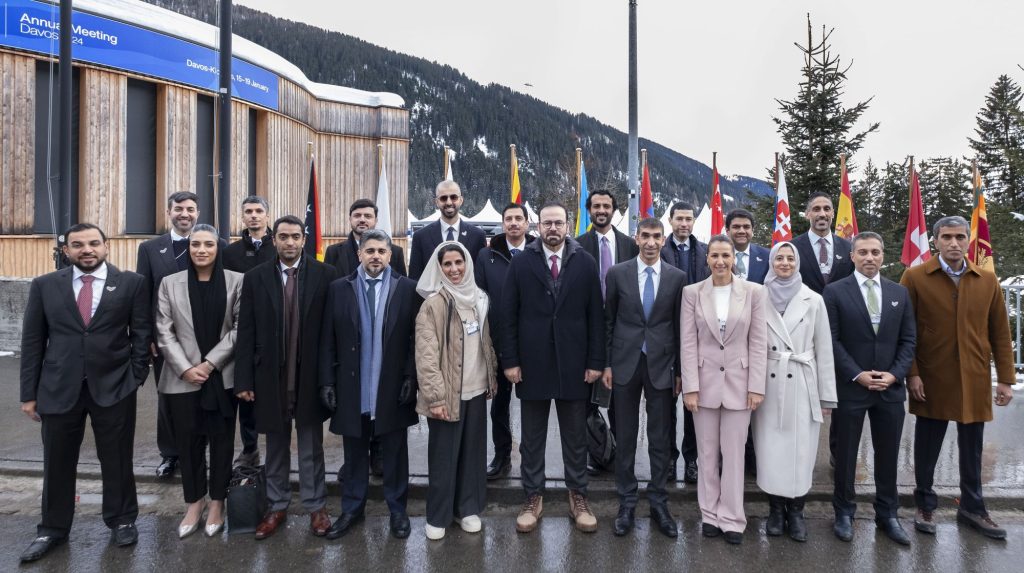
The UAE concluded its successful participation today in the 54th edition of the World Economic Forum (WEF) 2024, held here for the last five days.
This year, more than 100 prominent figures, including corporate leaders, the private sector, and government officials, participated in several sessions, panel discussions, conferences, and bilateral meetings.
Through its impactful participation at the forum, the UAE strengthened international cooperation and partnerships to foster stability, development, and prosperity. Additionally, the initiatives and agreements announced during the WEF support the country’s national priorities in building a more robust and faster-growing economy while enhancing competitiveness across all sectors.
Mohammad bin Abdullah Al Gergawi, Minister of Cabinet Affairs, emphasised that, as a key international player, the country is leading in shaping future trends and devising innovative and unconventional solutions to global challenges. This underscores its exceptional standing and active role, as guided by the vision of President His Highness Sheikh Mohamed bin Zayed Al Nahyan and the directives of His Highness Sheikh Mohammed bin Rashid Al Maktoum, Vice President, Prime Minister and Ruler of Dubai.
He said, “Distinguished by its proactive vision, unique developmental and economic model, and unparalleled contributions to bolstering international cooperation, the UAE has multiplied its credibility and garnered international trust in its impactful positive role across various regional and global issues.”
Al Gergawi added, “Given the importance it accords to the WEF, the UAE and its international partners presented new perspectives and pathways for sustainable solutions to the growing global challenges through the forum’s meetings. They engaged in purposeful dialogues to establish innovative economic frameworks that support continuous growth and the prosperity of societies.”
He said that the UAE’s proactive initiatives unveiled at WEF and the agreements it has signed promote the country’s influential global standing.
Effective presence for Private sector
Heads of national companies, corporate leaders, leading private sector firms and senior business leaders represented 80 percent of the participation from the UAE this year. Around 3,000 participants from over 100 countries gathered at the Forum.
This year’s edition brought together the largest number of corporate executives ever assembled. Their contributions play a pivotal role in building partnerships across various economic and developmental sectors, supporting sustainable development, and formulating solutions to key international developmental challenges.
For the second year in a row, the UAE participated with an exceptional pavilion under the theme of “Impossible is Possible”. It hosted a number of bilateral meetings, public sessions and press conferences that discussed various topics. The pavilion witnessed panel discussions for major private sector companies, CEOs of prominent national companies and officials in both the government and private sectors.
Strategic partnerships
Also, during the 54th edition of WEF, the UAE has signed several agreements aimed at solidifying its role as a reliable partner and a hub for global positive change across various fields. These agreements encompass humanitarian assistance and commitments to support international organisations’ programmes in enhancing living conditions for various communities.
Following the directives of His Highness Sheikh Mohammed bin Rashid Al Maktoum, Vice President and Prime Minister of the UAE and Ruler of Dubai, the Mohammed bin Rashid Al Maktoum Global Initiatives (MBRGI) pledged a contribution of around AED 37 million (US $10 million) in support of the healthcare sector in Gaza. This came as part of an agreement signed between MBRGI and the World Health Organisation (WTO) at the World Economic Forum.
Also, MBRGI has participated in the Food Innovation Hubs meeting, where it signed an agreement with the World Economic Forum to establish the Global Platform for Food Innovation Hubs to scale innovative solutions aimed at food transformation towards sustainable and more effective future options and enhance food production mechanisms globally.
MBRGI pledged AED 60.6 million in support of forcibly displaced persons, in the form of direct food aid and sustainable livelihood projects. Around AED 37 million of the MBRGI pledge will fund UNHCR’s humanitarian relief programmes and sustainable development interventions.
Additionally, the MBRGI announced a contribution of around AED30 million (US 8.1 million) to support programmes by the United Nations Children’s Fund (UNICEF), aiming at enhancing life conditions and providing a nutrition safety net for vulnerable children and women around the world.
Economic initiatives and key announcements
During its participation in the forum, the UAE launched qualitative initiatives aimed at empowering developing communities and enhancing global prosperity.
EcoMark Global Accreditation, one the main initiatives announced by the UAE during the forum, has been designed to boost the competitiveness of MSMEs in the global green economy by streamlining and standardising the regulatory processes surrounding sustainability benchmarking worldwide.
Also, the UAE Government and the World Economic Forum (WEF) have signed a partnership agreement to develop the “We the UAE for Strategic Intelligence 2031” platform, which represents a digital model powered by artificial intelligence, incorporating the best global knowledge resources and international experts in various sectors.
From the UAE pavilion in Davos, Newsweek Vantage International and the Swiss Horizon Group launched the results of the first edition of the “Future Possibilities Index” (FPI) report – 2024.
The UAE government initiative “Jahiz”, which was launched by His Highness Sheikh Mohammed bin Rashid in November 2022, was selected among the best global projects featured in the World Economic Forum – WEF’s global report “Building a Resilient Tomorrow” report.
As part of its agenda for participation, the UAE actively engaged in discussions addressing the opportunities and challenges presented by technological advancements and artificial intelligence in the education sector. Emphasis was placed on strategies for developing learning skills and exploring areas of collaboration between the public and private sectors to enhance innovative and productive educational models and experiences.
The UAE’s involvement at WEF included events related to economic sectors, foreign trade, investment, and environment. Discussions covered the influence of technology on the evolution of global trade and investment, the future of global trade, and the prospects of the new global trade order.












